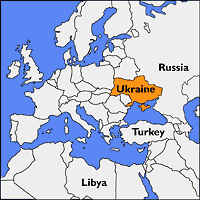|
The name 'Ukraina' means 'borderland', and was first given to the frontier lands round Kiev in the 12th century. Ukraine is now much bigger, a country of vast open plains lying between Russia to the east and Poland to the west. The position of Ukraine's frontiers changed many times. Control of the region was disputed between Poland and Russia over several centuries, and for some time it was part of the Austro-Hungarian empire. The Ukrainian people retained their sense of nationhood whatever regime was in power, and in the 19th century experienced a 'cultural awakening' as well. After the First World War, an attempt to form a republic of Ukraine was crushed by Russia's Red Army, and most of the country became part of the Union of Soviet Socialist Republics. (Part remained with Poland to the west.)
Ukraine's natural riches are its 'black earth' - the fertile crop-growing soil - coal and iron. The great expanse of cornfields, 'Russia's granary', was of great value to the Soviet regime, who had little interest in the opinions or welfare of the people who farmed it. These peasant farmers, smallholders whose only substantial enemies had been natural pests and drought, were now ordered to adopt communist policies. In 1921-2 the attempt to impose this order, and the seizing of Ukrainian food supplies by force, coincided with a natural drought. The result was a famine in which a million people died.
In 1924 Stalin became the leader of the USSR. He was determined to crush nationalism in Ukraine, and also to break the resistance of the kulaks, the smallholders who had made a success of their farms (and therefore a profit). Their free market system was condemned by communists, whose ideal was 'collectivisation': ownership of land and its produce by the state, which was the workers' employer and paid them a basic wage. In itself, this move towards equality had its virtues. But in practice it's an arrangement that can work only by consent, not by force, and then only if efficiently and honestly run. The peasant farmers of Ukraine - nearly 90% of the population - didn't care for the idea, and resisted it as strongly as they could. Meanwhile, management was now in the hands of communist party officials, who had little or no experience or training, and even less understanding of farming; and not all were either efficient or honest. The Stalin-led regime ruled by fear and force, with the aid of ruthless party activists and the powerful and brutal secret police.
In 1928 the kulaks found that their taxes had been raised. Then they were asked to provide greater quantities of grain. Their farms were forcibly confiscated for collectivisation. In response, many rebelled violently; some slaughtered all their animals before handing over their farms; others destroyed their machinery. Punishment was severe, and many were shot.
|
|
 |

